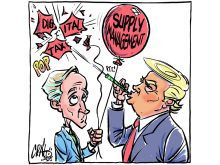THE FOLKS who store and retail fertilizer and crop protection products across the country have a problem with Canada’s complex butt-protecting federal government structure.
It is a situation that would have Czech writer Franz Kafka reaching for his pen. His stories about obtuse, farcical or unexplained bureaucratic decisions that leave people confused, frustrated and isolated in the maze of government regulations has created an adjective to describe official obtuseness – Kafkaesque.
What is happening to the agri-chemical retailers in Ottawa’s bureaucratic maze does not have the sinister underpinnings of many Kafkaesque stories but the inability to get bureaucratic decisiveness and straight talk certainly is.
Read Also

Agriculture needs to prepare for government spending cuts
As government makes necessary cuts to spending, what can be reduced or restructured in the budgets for agriculture?
Here’s an explanation of their dilemma.
Over the next four years, they face the imposition of tough new anti-terrorism regulations that will force them to dramatically increase security around their sites.
The problem is that agricultural chemicals have the potential to be used for criminal purposes if stolen or purchased by people with the intent of inflicting mass casualties or fear. The best example is the ability to use annonium nitrate fertilizer as a base for easily assembled bombs that have been used in the United States and threatened in Canada and the United Kingdom.
Since tougher security measures for these products are part of the so-called “war on terrorism,” the industry wants Ottawa to pick up some of the cost.
But they don’t know who to ask. No one in Ottawa will tell them. No department wants to face the decision to fund or not.
Agriculture Canada says it’s Public Safety. From there, the buck gets passed to Environment Canada or Industry Canada or Finance Canada.
The result, according to Canadian Association of Agri-Retailers executive director David MacKay, is that many of the 1,500 agriculture chemical retailers across the country face the prospect of tens of thousands of dollars in investments many cannot afford.
“The costs associated with staying compliant to these new requirements are reaching levels that may make it prohibitive for some if not all retailers to incur and thus threaten the economic viability of our entire sector,” the Winnipeg-based industry representative told MPs on the cusp of their summer break in late June.
He said the total cost of required upgrades over the next four years will be $120 million and the sector is proposing Ottawa pick up $90 million.
During his Parliament Hill appearance, MacKay asked for MP help in at least identifying a lead department with the ability and authority to make a decision.
“There is no question that we’re not satisfied currently with where this issue lies and which department owns it,” he said. “We have not been given any indication yet as to which department should take the lead on this issue.”
It is a clear instance of inter-departmental buck-passing, in part to avoid paying bucks and in part to avoid making the decision on whether the cost of government-imposed regulations should be paid solely by the industry.
The business people whose operations depend on this deserve at least a straight government answer on where the buck stops. Kafkaesque indeed.
















